In this article, we will try to understand how safe it is to live in Cyprus.
We have identified several safety categories for ourselves:
Today, we will focus on personal safety and the safety of personal property.
In Cyprus, serious crimes are those that cause significant harm to life, health, or property, or that threaten public safety. These include crimes such as murder, grievous bodily harm, rape, kidnapping, acts of terrorism, and major property crimes like burglary, robbery, and large-scale fraud. Such crimes are typically punished with long-term imprisonment, up to life sentences.
Less serious crimes include petty theft, vandalism, hooliganism, public disorder, and minor traffic violations. For these offenses, Cypriot law provides lighter punishments, such as fines, community service, or short-term imprisonment.
In recent years, the crime situation in Cyprus has undergone changes, as reflected in the statistics for serious offenses from 2021 to 2023. This analysis examines crime trends by offense category, clearance rates, and changes in the main types of serious violations.
In the category of crimes against public order and administration, there has been a steady decline in the number of reported offenses. In 2021, 49 violations of public order were recorded, dropping to 32 in 2023. This indicates an improvement in this area. The clearance rate for these crimes remains consistently high: 91.8% in 2021, 85.7% in 2022, and 90.6% in 2023. This suggests that law enforcement agencies are effectively handling investigations of such violations. Crimes against administration also show positive changes. In 2021, there were 106 such offenses, but by 2023, the number had decreased to 53, representing a twofold reduction in these types of violations. The clearance rate is also high: 97.1% in 2021 and 90.5% in 2023. These figures point to stability and successful law enforcement efforts in this area.
An analysis of crimes against persons shows a slight decline in their number, from 264 recorded cases in 2021 to 226 in 2023. This can be viewed as a positive change, indicating a decrease in violent crimes in Cyprus. The clearance rate also demonstrates strong performance, increasing from 90.5% in 2021 to 91.6% in 2023. However, it is important to note that certain types of crimes remain a pressing issue. For example, despite the overall reduction in crimes against persons, serious offenses such as murder, rape, and attempted murder continue to pose a challenge for the law enforcement system.
Crimes against property stand out from other categories due to a sharp increase. In 2021, 1,671 property-related offenses were recorded, rising to 2,134 in 2022. In 2023, there was a slight decrease to 1,914 offenses. Nevertheless, property crimes remain a significant problem. Particularly concerning is the low clearance rate. In 2021, it was 56.7%, and in 2023, it slightly improved to 57.3%, which is significantly lower compared to other categories of crime. This points to the need for enhanced efforts by law enforcement in combating property-related offenses.
Let’s examine the main types of serious crimes that cause the greatest public concern:
From 2021 to 2023, the number of murders decreased from 14 to 10. This is a positive trend, but the clearance rate for murders dropped to 80% in 2023, which requires further attention.
The number of attempted murders increased from 13 in 2021 to 15 in 2023, while the clearance rate remains consistently high (86.6% in 2023).
The number of rape cases fluctuated, peaking at 57 in 2022 before declining to 36 in 2023. The clearance rate remains consistently high at around 90% each year, indicating effective investigative work in this area.
This type of crime has shown steady growth, rising from 172 cases in 2021 to 194 in 2023. However, the clearance rate remains extremely low, at less than 20%, highlighting significant challenges in this area.
In 2021, there were 95 recorded cases of robberies and extortions, with 62 cases solved, amounting to about 65%. In 2022, the number of crimes increased to 123, with clearances rising to 92 cases (75%). However, in 2023, the number of robberies decreased to 84, with a clearance rate of 65%.
The number of drug-related crimes significantly increased each year. In 2021, there were 861 cases, which rose to 1099 by 2023. Nevertheless, the clearance rate remained high: 95% in 2021, 94.7% in 2022, and 94.2% in 2023.
This type of crime is rare but crucial for safety. In 2021, there were 21 cases reported, but only 3 were solved (14%). In 2022, the number of such crimes dropped to 19, with only one solved (5%). In 2023, there was a significant increase to 40 cases, but the clearance rate remained low at just 27%.
In 2021, 840 cases of burglary and housebreaking were recorded, with only 454 cases solved (54%). In 2022, the number of crimes rose to 1103, and the clearance rate increased to 59%. In 2023, 1091 cases were registered, with 644 cases cleared (59%).
In 2021, there were 527 thefts reported, with 241 cases solved (45%). In 2022, the number of thefts rose to 613, and the clearance rate slightly improved to 50%. In 2023, 583 thefts were recorded, with 269 cases cleared (46%).
The data presented below should not be taken as the ultimate truth but rather as a guideline. This is because the figures are provided without considering the population density of each district. Naturally, in Limassol, with its larger population, the number of crimes is higher than in the smaller Famagusta. However, if you are looking for a safe place to comfortably live as a tourist or to settle down, it is worth considering this district-based crime data.
Minor Crimes:
Serious Crimes:
Conclusion for Nicosia:
Minor Crimes:
Serious Crimes:
Conclusion for Limassol:
Minor Crimes:
Serious Crimes:
Conclusion for Larnaca:
Minor Crimes:
Serious Crimes:
Conclusion for Paphos:
Paphos shows a steady improvement in the clearance rate for minor crimes, reaching 91% in 2023.
For serious crimes, the clearance rate is also quite high, making this district one of the safest.
Minor Crimes:
Serious Crimes:
Conclusion for Famagusta:
Famagusta shows high clearance rates for both minor and serious crimes, particularly in 2023, when the clearance rate for serious crimes rose to 86.5%. Although there was a surge in serious crimes in 2022, the situation stabilized in 2023.
For minor crimes, the district consistently shows strong results, with clearance rates exceeding 85% over the past two years.
Based on the data from 2021–2023, the safest regions can be identified as Larnaca and Famagusta. These areas consistently show a high crime detection rate for minor offenses (over 85%) and a solid detection rate for serious crimes, especially in 2023.
Paphos also stands out for its strong detection rates for both minor and serious crimes.
Nicosia and Limassol perform well in terms of minor crimes, but they face challenges in detecting serious crimes, which lowers their ranking as the safest areas.
The crime rate in Cyprus stands at 31.07, indicating a moderate level of threat. This figure suggests that crime exists but remains under control. Compared to other EU countries, where the rate can range from 16 to over 40, Cyprus is positioned closer to the middle of the list.
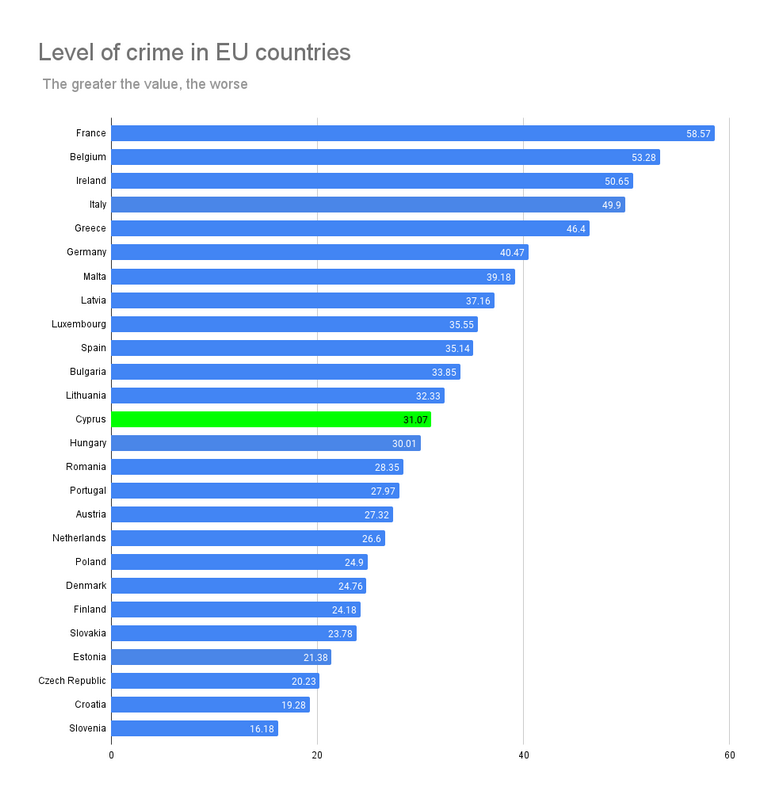
There is significant concern that the population of Cyprus believes crime has increased over the past five years. This rate is above the EU average, reflecting growing public anxiety and the perception of a worsening situation.
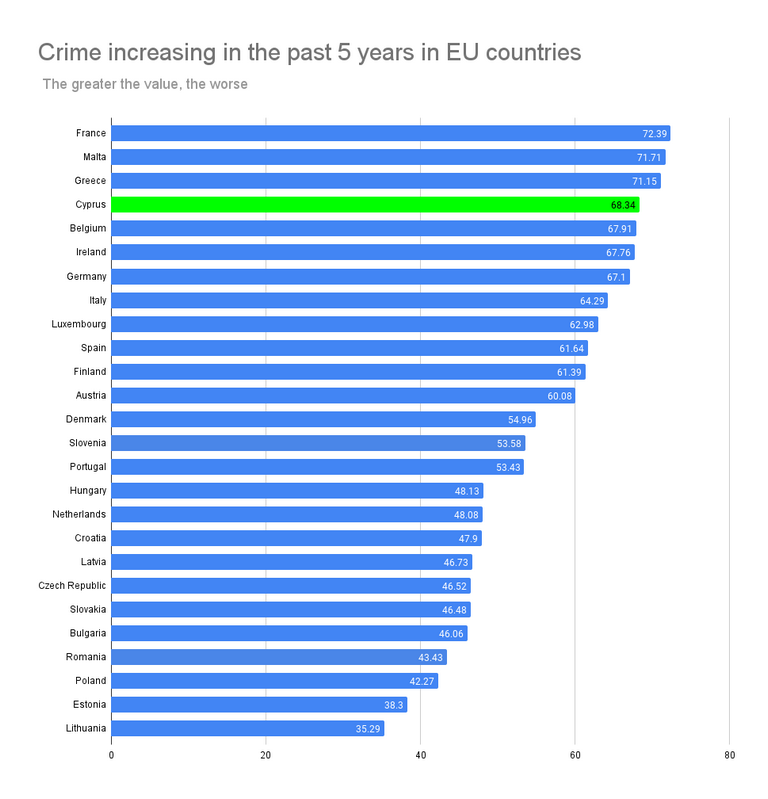
In Cyprus, people express concern about potential home burglaries, which is also above the EU average. This indicates that home security remains a relevant issue for a significant portion of the population.
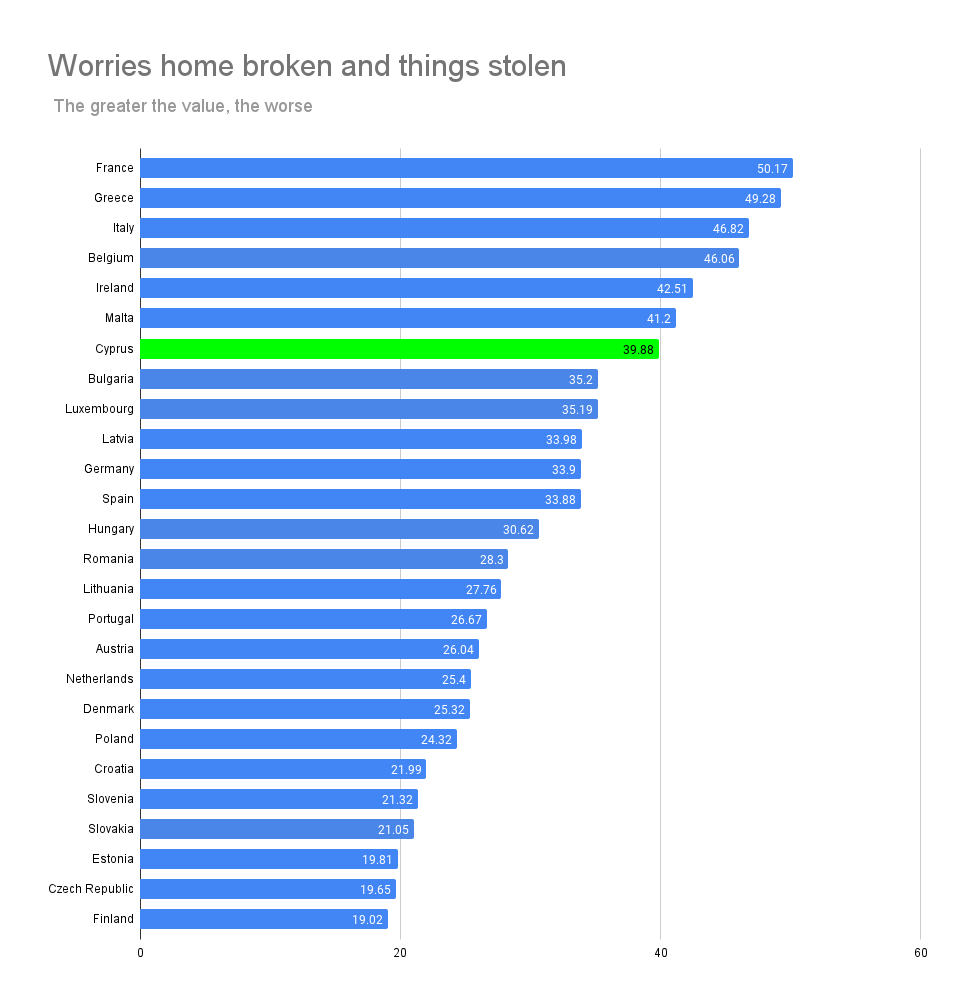
The level of concern about robberies in Cyprus is 23.73, which is close to the EU average. While this rate is higher than in some countries with lower crime rates, it still indicates a moderate level of fear.
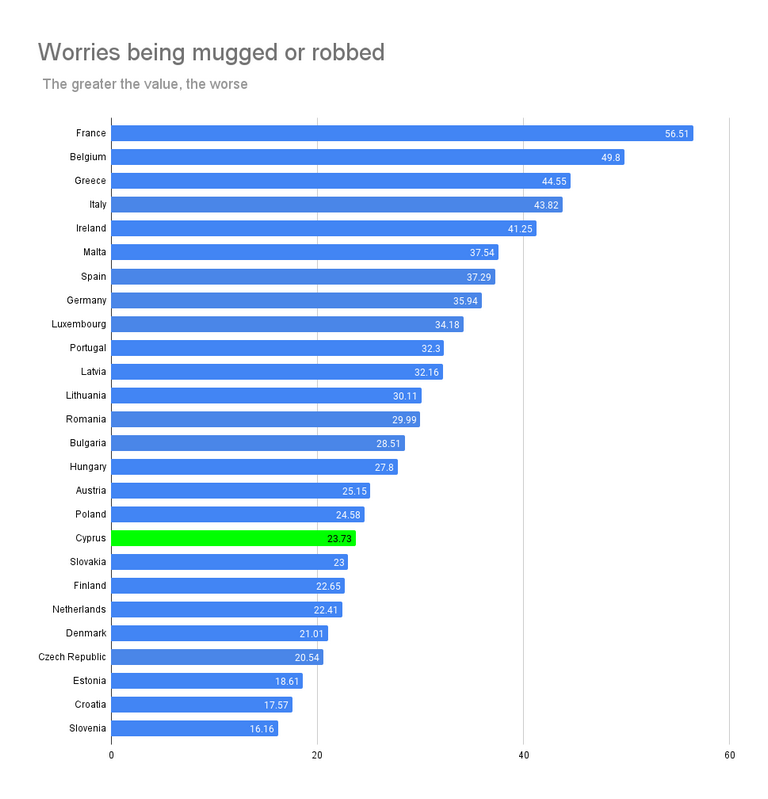
Concern about car theft in Cyprus stands at 22.37, slightly above the EU average. Although this is not a major issue, such fears are still present.
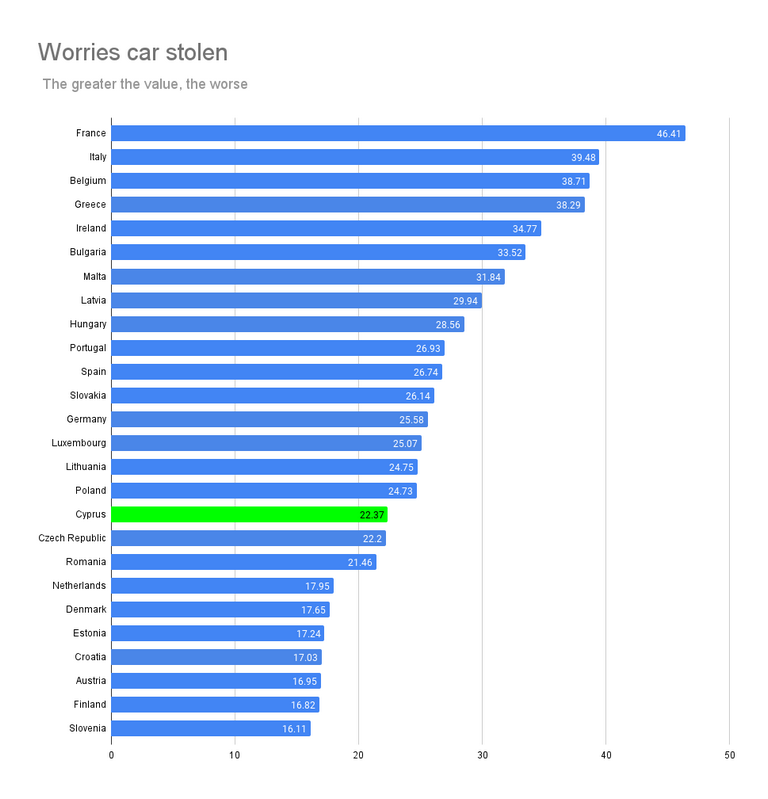
Theft from cars is a concern for the population of Cyprus, with a rate above the European average. This factor may be linked to the spread of petty crimes in major cities and tourist areas.
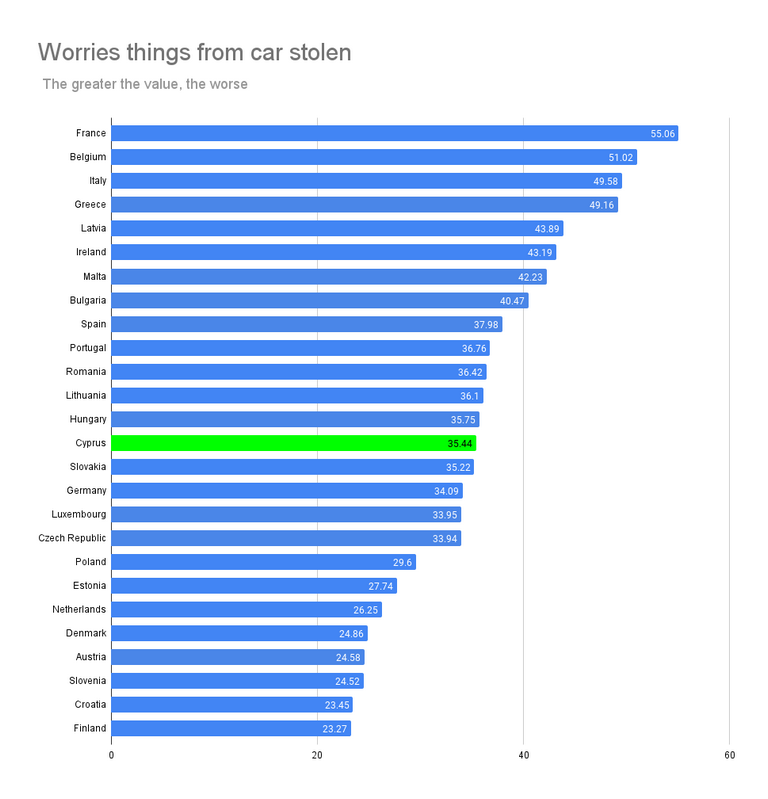
Concern about assaults in Cyprus is rated at 22.51, placing the country at one of the lowest level within the EU. This indicates that fear of violence exists but is not excessive compared to other European countries.
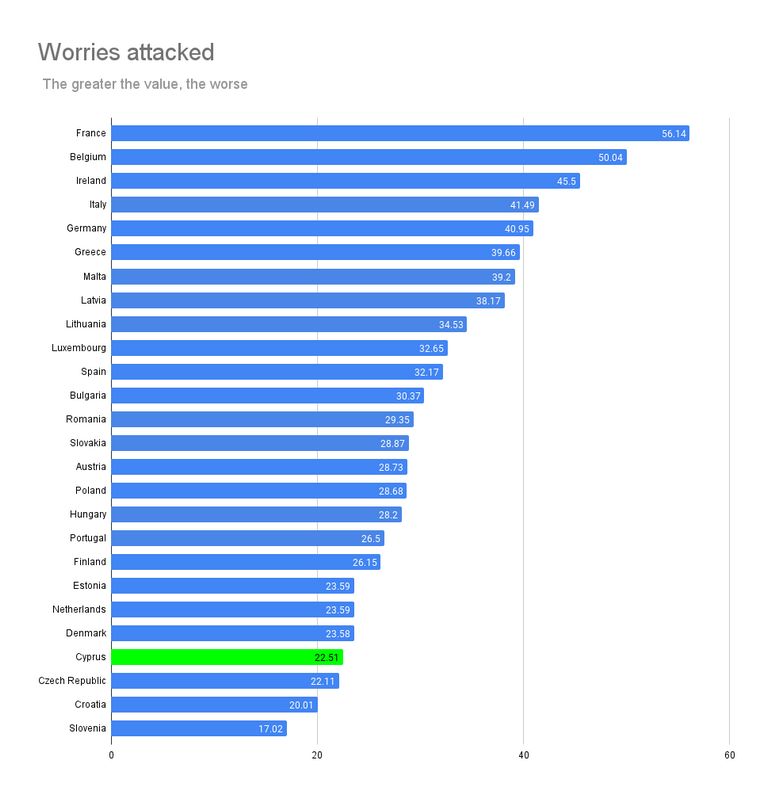
Cypriots are concerned about facing insults at a rate of 28.61, also higher than the EU average. Insults can include both verbal and physical threats, contributing to the overall tension.
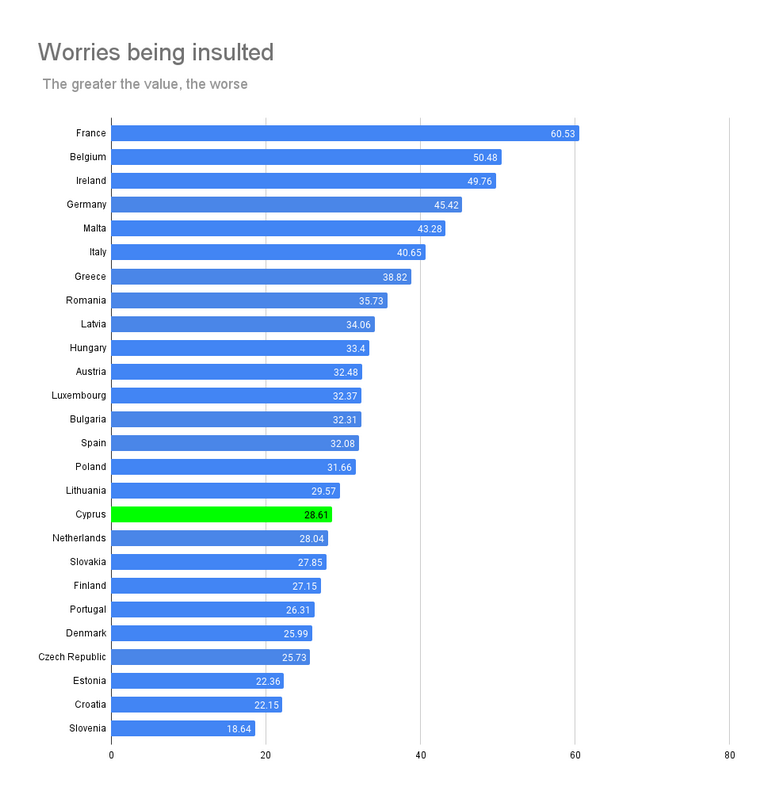
In Cyprus, there are concerns about attacks based on ethnicity, gender, or religion. This rate is higher than in countries with less diverse populations and may reflect social tensions in this area.
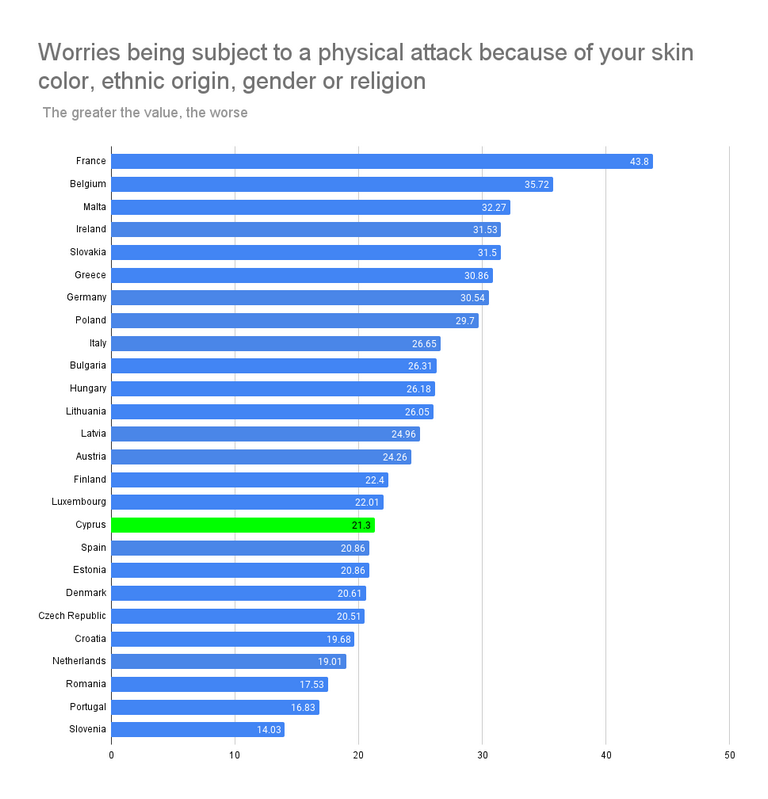
The level of drug-related issues in Cyprus (35.93) is also above the EU average. This could be related to the country’s geographical location, which makes it a convenient transit point for drugs.

The problem of vandalism and property theft in Cyprus is rated at 37.83, indicating significant public concern about destructive actions and theft, likely tied to the rise of petty crime.
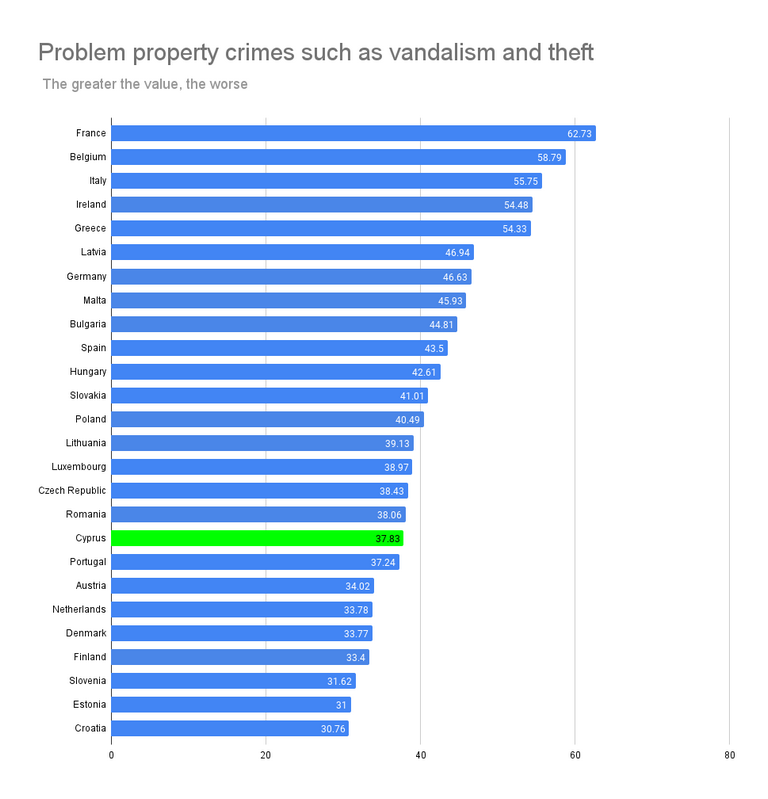
The population of Cyprus views violent crimes, such as armed robbery, as a problem. This is an average rate within the EU, suggesting the presence of such a threat but not its dominance.
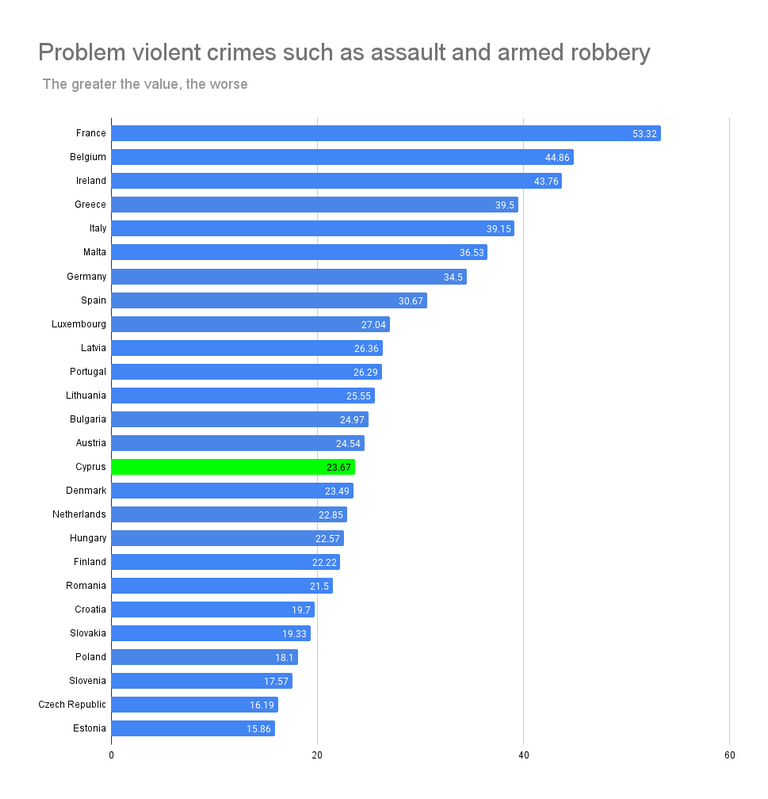
Corruption is a significant issue in Cyprus, with this rate much higher than the EU average. This may reflect problems within the country’s governance system.
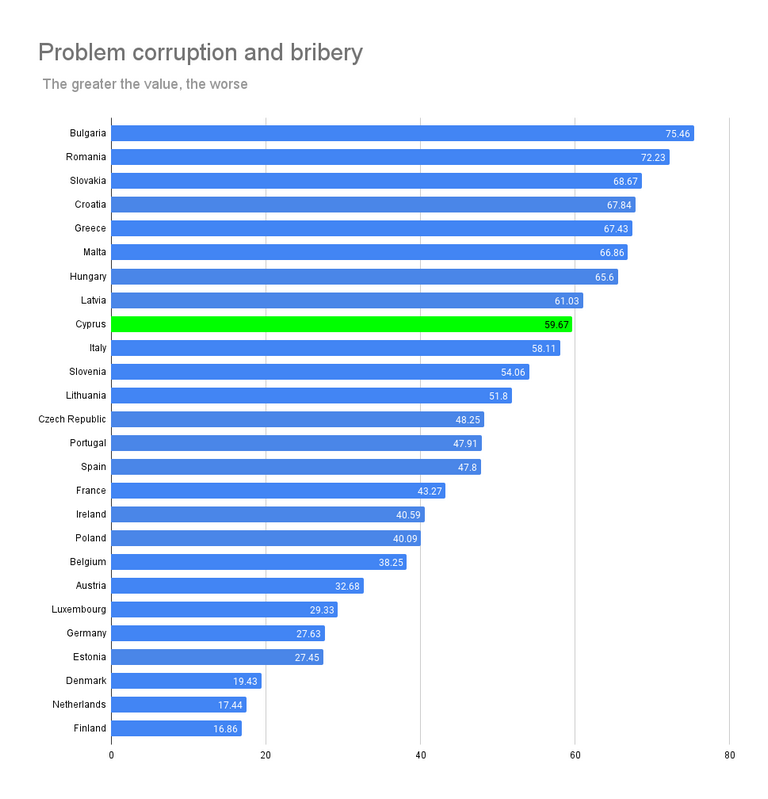
The level of safety during daytime walks in Cyprus is 84.17, which is a positive indicator. This is above the EU average and suggests that people feel relatively safe during the day.
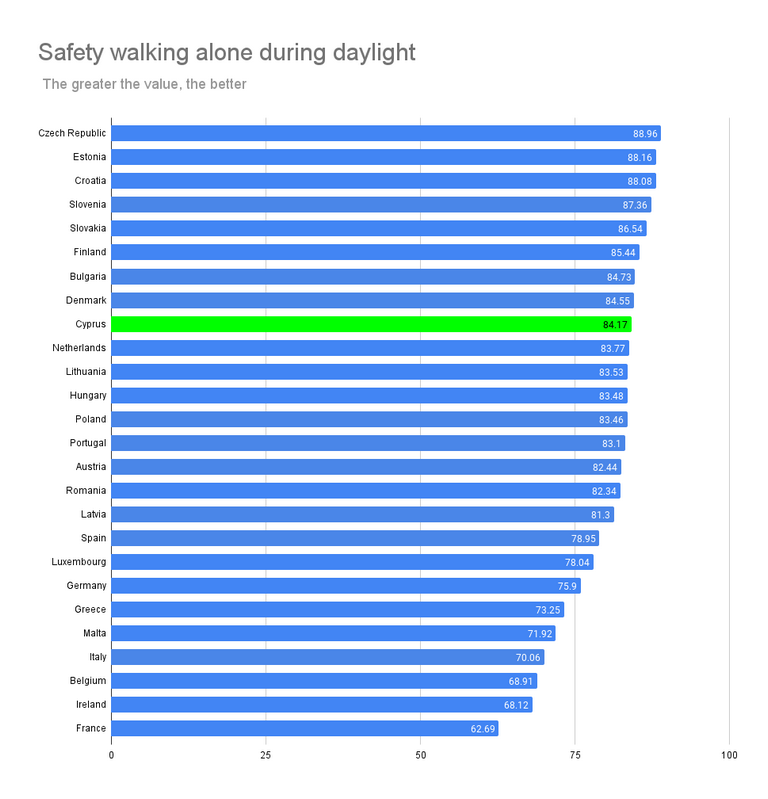
Nighttime walks evoke less of a sense of safety compared to daytime. This rate is lower than in some other EU countries, which may be linked to concerns about nighttime crime.
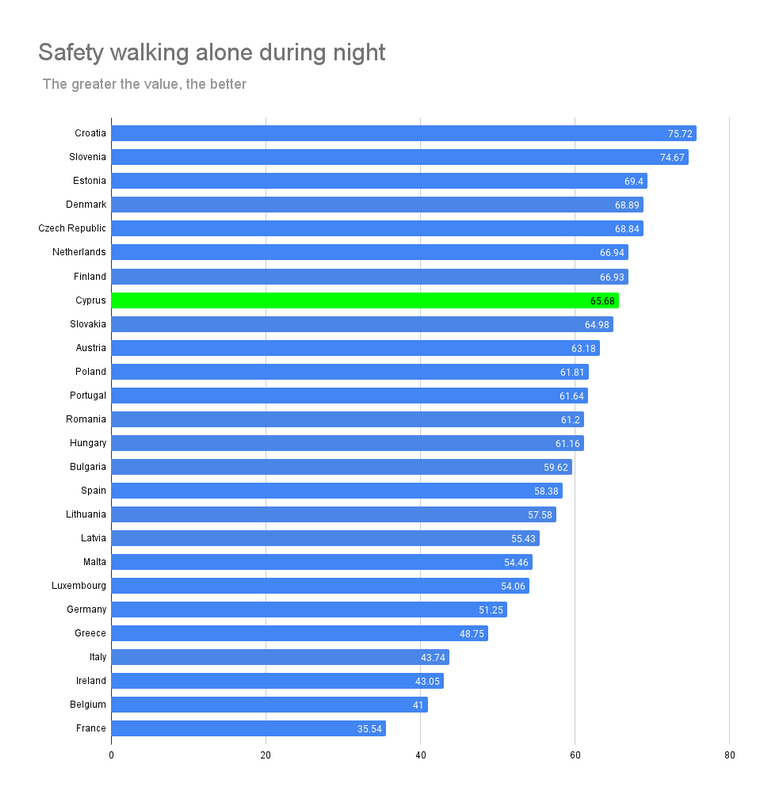

Cyprus remains one of the safest places in Europe, despite the growing crime rate, which is likely linked to the increasing population and the rising number of tourists. However, since the authorities are highly invested in developing Cyprus as a business hub and a tourism center, they are making every effort to enhance safety. This is reflected not only in the reduction of personal crimes in 2023 compared to 2022 but also in the improvement of crime clearance rates.
Safety in Cyprus is supported not only by the work of law enforcement but also by the island’s overall social atmosphere. Tourists and new residents can feel secure in any district, whether in major cities like Limassol and Nicosia or smaller areas like Paphos and Famagusta. It is, however, important to consider crime statistics when choosing a place to live or vacation in, to make the most informed decision.
Overall, Cyprus remains an excellent place for a peaceful and safe life or travel.
Sousrces: Numbeo, Cyprus Police Statistics
No results available
Support
Information
Cookie Consent. We use cookies to improve your experience, analyze traffic, and personalize content. By clicking "Accept," you consent to our use of cookies. Cookie Policy Privacy Statement